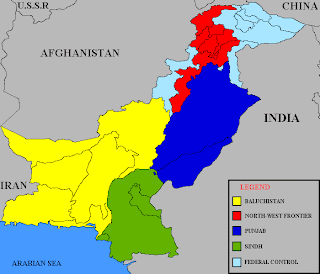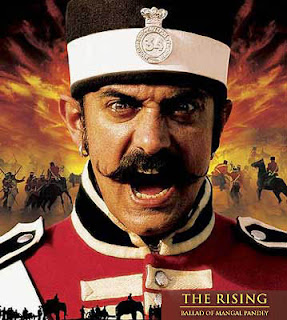February 16, 2007
February 14, 2007
1971 Series
Posted by
Jajabor
at
10:41 PM
3
comments
![]()
Labels: Bangladesh, History, India, Islam, Pakistan
Speaking of Pakistan
This Tuesday, at 11:00 AM, I am lecturing on Jinnah and the Muslim League as a part of a South Asia course. 2nd floor, Mathematics Building, Columbia University, if you want to make it.
I am a tad nervous. Not so much because of stage fright, but more so because it's always hard to talk about Jinnah and the idea of Pakistan. Too many people seem to have axes to grind when it comes to this topic. I have none. I care about being sensitive to all sides.
The idea of Pakistan is intrinsically tied to both Pakistani and Indian nationalisms. For the Indian state, the fact of Pakistan's creation was anathema because it gave the lie to its claims to represent both Hindus and Muslims of Hindustan.
Of course to Pakistani nationalists, the idea of Pakistan is deeply meaningful. Pakistan meant to be the homeland for all of South Asia's Muslims. Critics of Pakistan point out that Jinnah's two-nation theory - that Muslims and Hindus were two separate nations - was an outcome of colonial rule and thinking. They criticize Jinnah for adopting it. Other critics have alleged that Pakistan was merely a bargaining table for Jinnah.
They point to facts of post-47 history to validate these claims. Urdu was popular largely among the Mohajirs from India and Punjabis. The Punjabi-Mohajir nexus was set in place as long as Punjabis dominated the army, the most powerful institution in Pakistan by far.
Meanwhile, Balochis, Sindhis, Bengalis and Pathans all demonstrated autonomous tendencies in varying degrees - the most outspoken of them being perhaps the Bengalis and Balochis. Many of these autonomous mo vements were borne of an expression of cultural distinctiveness.
vements were borne of an expression of cultural distinctiveness.
I heard recently that in the Balochi uprising (that Mr. Bhutto suppressed with an iron hand) many of Sheikh Mujib's writings and formulations for East Pakistani autonomy were widely read in Balochistan.
Was Jinnah's Pakistan then a mistake?
There are defenses possible of course to Jinnah's designs.
Jinnah wasn't necessarily the Miltonic self-absorbed nation-maker that many of his critics like to see him as. It was important from him to have a flexible idea of Pakistan because its spatial boundaries were far harder to define, as Indian Muslims were diffused all over. It was important for the idea of Pakistan to develop gradually.
And Jinnah wanted a far more complex Pakistan. First up, he wanted the whole of the Punjab and the whole of Bengal. This would have made a substantial difference.
Think about this. Sikhs and Hindu Punjabis continued to dominate the Indian Army at least for a while, the way Punjabi Muslims dominated the Pak Army. If Pakistan included the whole of Punjab, the Pakistan Army would have been mighty. And religiously diverse.
Religious diversity in the most important state institution of Pakistan would have gone a long way in defining its nationalism.
Secondly, if Pakistan had the whole of Bengal (Jinnah wanted Calcutta), the civil-bureaucr atic administration of new Pakistan would have been far more colorful and complex. Bengali Hindu Bhadraloks, were prominent in the early years of the Congress in the early days of India.
atic administration of new Pakistan would have been far more colorful and complex. Bengali Hindu Bhadraloks, were prominent in the early years of the Congress in the early days of India.
If Pakistan had absorbed these Calcutta-based civil servants, bureaucrats and intellectuals, their presence would have greatly changed the character of Pakistan. We would have had on our hands, a far more composite, pluralistic and diverse Pakistan in the upper echelons of civil-bureaucratic-military administrations.
However, the realities of 1950s and 60s Pakistan were starkly different. The state failed to incorporate the Bengalis of East Pakistan into its fold, neither economically nor politically or culturally, and events of '71, perhaps not in their gruesome form, now appear inevitable to those that look back and reflect.
To my Bangladeshi and Pakistani readers:
The post is not an exercise is pro-Pakistani nostalgia or anti-Pakistani rhetoric, but in reminding ourselves of the complex trajectories of history that are too often levelled into simple narratives.
February 06, 2007
Family Memories?
 These days I am fascinated by the workings of old, handed-down, memories. I was reading somewhere for a project on Sufism in America, how African American Islam and its "explosion" in the '70s had something to do with the fact that some of the founding fathers, Elijah Mohammad and Noble Drew Ali, all had family memories of Islam.
These days I am fascinated by the workings of old, handed-down, memories. I was reading somewhere for a project on Sufism in America, how African American Islam and its "explosion" in the '70s had something to do with the fact that some of the founding fathers, Elijah Mohammad and Noble Drew Ali, all had family memories of Islam.
Family memories?
A personal example from my own family: My family is Bengali Muslim. But my maternal grandparents are from parts of what's today Bangladesh (Bikrampur/Vikrampura) where many Hindu kingdoms flourished. And we know that many of maternal ancestors were Hindus, not so long ago either.
I recall childhood memories of my grandmother's overwhelming knowledge of various Hindu rituals local to Vikrampura. She had memories of her mother (Jajabor's great grandmother), sticking leaves between pages of books to call upon the goddess Saraswati and her blessings, although she was Muslim. Of course, we all know about Bengal's syncretic Muslim past in which local Hindu-Buddhist and Muslim traditions intermingled freely.
My mother is also acutely aware of such aspects of our ancestral past. I, myself, will probably continue to hand down the baton of such family memories and conversations.
The idea that a conversation can survive four or five generations may ring true, what may appear less obvious is the idea that the proliferation of Islam among African Americans in the 1970s, had much to do with family memories of Muslim slaves brought over from the African continent by the British centuries earlier.
Both Elijah and Drew Ali's ancestors were slaves. But they worked in plantations on the sea-coast islands of Georgia and South Carolina. In these predominantly sugar and rice plantations, slaves outnumbered slave-masters by much, and a degree of cultural autonomy was possible, enabling the Islam that came from Africa to America to survive and its memories linger across generations.
Don't know how many of you ran into the story of Mayor Ellis recently. I was intrigued to see how this sort of reawakening of very old and inactive traditions still happens. Georgian Mayor , Jack Ellis, who converted to Islam, spoke of "family memories" as he explains his recent conversion to Islam.
Posted by
Jajabor
at
9:30 AM
1 comments
![]()
Labels: History, Islam, Memory, Religion, Western Muslims
January 20, 2007
Present's Trespass on the Past
History or rather the space of history writing often becomes the battle-ground for competing visions of a nation. In the case of Indian history, many historians, many of whom work out of Delhi or American or British universities often find themselves in an inevitable dialog with present political concerns.
It is often the case that the most ancient of histories are ones with the greatest relevance to present political concerns. This can happen when nationalists start looking back to define a nation and explain roots of a people. For example, the questions of whether the Aryans (by extension, Hindus) were indigenous to India becomes important for Hindutva folks because much of their nationalist ideology rest on the assumption that Hinduism in native to South Asian soil while Islam is foreign. Some of this political rhetoric that drove people to destroy the Babri Masjid and dismember entire Indian Muslim populations, rests on the flimsiest archaeological and numismatic evidence. The other area of controversy in Indian history writing has to do with the period of Muslim rule in the subcontinent.
Debates rage over how benevolent and tolerant Muslim rulers were to the subcontinental population. On the one hand you have modern-day secularists propelled by the Nehruvian dream who highlight the tolerance of Emperor Akbar, his love for his Rajput wife, his concoction of a new religion despite protests from Muslim orthodoxy, the fusion of the "Indic" and the "Islamicate" in Indian cuisine, music and architecture and so on. On the other hand, you have badla-minded folks, with an axe to grind to undo what they see as historical wrongs, ranging from destruction of Hindu temples to Aurangzeb's persecution of certain prominent Hindus and Sikhs. Methinks Hollywood should make a movie on the Mughal Empire in all its splendor, diversity and tensions.
History-writing has also attracted controversy in Pakistan. After General Zia came to power, at a time when Islamism of a certain conservative kind was flourishing all over from Egypt to Iran to Afghanistan, new syllabi were devised to provide historical depth to Pakistan's Islamic nationalism. In Pakistani school textbooks, the 1965 war against India became absorbed into chapters on Islamic history and written alongside great battles in early Islam. Pakistani school children were goaded to understand their heritage as not one that was Indic, but one that was continuous with 10-11th century CE Turks in South Asia. Ridiculous but unsurprising then is President Pervez Musharraf's claim in his recently published, highly self-congratulatory autobiography, that both the Urdu language as well as Pakistani cuisine have evolved out of Turkish counterparts. Completely ignoring their more substantial similarties with languages and cuisines South Asian.
Historigraphy in Bangladesh has also drawn attention of late among secular circles, and rightly so. A certain politicization seems to be creeping in. After a conversation with Dr. Muntassir Mamoon, a popular Bangladeshi intellectual, greatly harangued by student wings of the ruling coalition - I confirmed that references to the word "Rajakar" are being dropped from secondary school history books ["Rajakar" ("Razakar" in Persian) was a term used for loyalists who were against the creation of the Bangladeshi state]. Moreoever, the chapter that describes atrocities committed during '71 on the Dhaka University campus, have dropped mention of Jagannath Hall. Curiously, Jagannath Hall was the site of the largest massacre of DU students, a largely Hindu dormitory. Furthermore, the new set of authors have dropped Sheikh Mujib's adornment of "Bongobondhu." And if one compares the older school history texts before and after the ruling Jama'at-BNP cartel - mention of Mujib has dropped noticeably.
Posted by
Jajabor
at
3:42 PM
0
comments
![]()
Labels: Bangladesh, History, India, Islam, Pakistan


